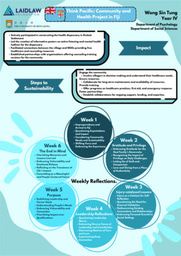Think Pacific Expedition to Fiji: Chapter 2
I was now the proud daughter of a Fijian family of (originally) two parents (Ta Solo, and Na Kesa) and three young boys (Waise, Buka and Vili). While the nights felt colder, water and electricity was limited, but there was happiness, there was excitement. The village was full of dance, Kava (Traditional Fijian drink), and song, as they welcomed us with a Sevusevu, which is a Fijian celebration to welcome visitors.
With that excitement, there was also gratitude. What must our host family have gone through to make us feel comfortable? Our family is one of the youngest families in the village, meaning that they weren’t working with a lot of resources, but they opened their home to my roommate, Isha and I, and reached out with loving arms. It was true what they said, that those with the least are the most giving.
The experience made it obvious that I struggled because of my privilege. I struggle when going to the washroom and showering without a light, when showers are a little too cold, when night-time creatures scare me, when sometimes the electricity and water runs out, I struggle with all of this because being privileged has sheltered me from what real life is like. When we learn from what our parents say to not take things for granted, we don’t truly understand what that means until we really live a day without the things we take for granted to realize how easy life has been made for us.
It could have been even more difficult to adjust if it hadn’t been for my Fijian family, with my Na (Fijian for Mom) and Ta (Fijian for Dad) had been so accommodating to our needs. They made it easier for us in an environment where it could have been a lot more difficult to get accustomed to. While acknowledging my own privilege was a difficult thing to do starting off, it was that same acknowledgment that gave me the ability to feel gratitude.
Having privilege and learning about it doesn’t mean I had to feel guilty about it, either, which is a common reaction to learning about one’s own privilege. It wasn’t about trying to relinquish that privilege and giving it to people who are less fortunate, because that’s not the point either (nor is it feasible). Where is that guilt coming from? Who says that less fortunate people desire a “better” life, as if livelihood can be compared based on assets and monetary factors? Isn’t guilt just coming out of the assumption that we’re better than other people? Are we just first-world people working off the first-world assumption that “first-world” means everyone wants to live the way that we do?
We just live in different ways, and that’s okay. No one is inherently better in terms of how we live our lives. Our privilege enables us to have more resources, but our ways of living are not comparable, and it’s a slippery slope to start comparing what we have and what we don’t have, feeling guilty and becoming charitable because of that guilt. Love out of the goodness of your heart and for the benefit of the people, not out of the dark pits of guilt and to fill your own void.

Please sign in
If you are a registered user on Laidlaw Scholars Network, please sign in